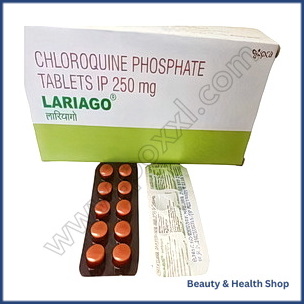ADDICTION
ALCOHOL DEPENDENCE
QUIT SMOKING
ALLERGY
ANTI FUNGAL
FUNGAL INFECTION
FUNGAL NAIL INFECTIONS
ANTI-REJECTION DRUGS
ANTI WORM
ANTIBIOTIC
BACTERIAL INFECTIONS
ARTHRITIS
GOUT
OSTEOARTHRITIS
RHEUMATOID ARTHRITIS
BLOOD
LOW PLATELET COUNT
THROMBOPHLEBITIS
VARICOSE VEINS
COLON
ANAL FISSURE
PILES
ULCERATIVE COLITIS
DIABETES CARE
DIABETES INSIPIDUS
DIABETES TYPE
DIABETIC FOOT ULCERS
GLUCOSE MONITOR
EYES/EAR CARE
DRY EYES
EYE CARE
EYE EXAMINATION
EYE INFECTION
EYE LASHES
EYE PAIN
GLAUCOMA
OCULAR HYPERTENSION
UVEITIS
FEVER CARE
MALARIA
RHEUMATIC FEVER
TYPHOID FEVER
GASTROINTESTINAL
ACIDITY
CONSTIPATION
CROHN'S DISEASE
DIARRHOEA
GALLBLADDER STONES
INTESTINAL ULCERS
IRRITABLE BOWEL SYNDROME
MOTION SICKNESS
NAUSEA
Lariago 250 mg (Chloroquine)
| Active Ingredient (Generic Name): | Chloroquine |
|---|---|
| Indication: | Malaria |
| Manufacturer: | Ipca Laboratories Ltd |
| Packaging: | 10 tablets in one strip |
| Strength: | 250 mg |
From: $75.00
Lariago 250 mg (Chloroquine) is often prescribed to treat and prevent malaria, effectively targeting different Plasmodium parasite strains. For malaria, it kills parasites in the bloodstream. It also helps in autoimmune conditions like rheumatoid arthritis by suppressing the immune system. Dosage depends on your condition and medical advice. Combining it with other medications may enhance symptom management. Follow your healthcare provider’s guidance for best results. Remember, if you explore further, you’ll discover additional uses and important precautions related to Lariago 250 mg (Chloroquine).
Start here to understand the benefits of Lariago 250 mg (Chloroquine) for your health. Lariago, also known as Chloroquine, is a medication that is commonly used to treat and prevent malaria, a disease caused by parasites transmitted through mosquito bites. This medication works by killing the parasites in the red blood cells, effectively treating the infection and preventing its spread in the body.
One significant benefit of Lariago is its effectiveness in treating malaria caused by various strains of the Plasmodium parasite. By targeting the parasites directly, Lariago helps to alleviate symptoms such as fever, chills, and sweating associated with malaria. Additionally, Lariago is also used in certain cases to treat autoimmune conditions like rheumatoid arthritis and lupus erythematosus.
It is important to note that Lariago should only be taken as prescribed by your healthcare provider, as improper use can lead to serious side effects. Always follow the recommended dosage and duration of treatment to guarantee the best results and minimize the risk of complications.
Why is this medication prescribed?
To understand why healthcare providers prescribe Lariago 250 mg (Chloroquine), it is essential to recognize its effectiveness in treating malaria and certain autoimmune conditions. For malaria, Lariago works by killing the parasites causing the disease in the bloodstream. In autoimmune conditions like lupus and rheumatoid arthritis, Lariago helps by reducing inflammation and suppressing an overactive immune system. This medication is prescribed when other treatments have not provided sufficient relief or when the benefits outweigh the potential risks.
In malaria cases, the dosage and duration of Lariago treatment depend on the type of malaria, the severity of symptoms, and the individual’s health condition. When used for autoimmune conditions, the dosage is typically lower and may be combined with other medications to manage symptoms effectively. It is important to follow your healthcare provider’s instructions carefully and complete the full course of treatment to ensure the best possible outcomes. Remember to consult your healthcare provider for personalized advice and guidance on using Lariago for your specific condition.
How should this medicine be used?
When using Lariago 250 mg (Chloroquine), follow the dosage instructions provided by your healthcare provider for optimal treatment outcomes. Typically, this medication is taken by mouth with or without food. It is vital to take Lariago at the same time each day. Make sure you measure the liquid form of this medicine with a special dose-measuring spoon or cup, not with a regular table spoon.
The dosage of Lariago is based on your medical condition, weight, and response to treatment. Do not increase or decrease your dose without consulting your healthcare provider. It is essential to continue taking this medication even if you feel well, as stopping it too early may lead to the infection returning. If you are unsure about any aspect of taking Lariago, do not hesitate to ask your healthcare provider or pharmacist for clarification. Remember to store this medication at room temperature away from light and moisture.
Other uses for this medicine
Considering the versatility of Lariago 250 mg (Chloroquine), this medication may also be utilized for other purposes beyond its primary prescribed use. In addition to treating malaria, Chloroquine has shown potential in the treatment of certain autoimmune conditions like rheumatoid arthritis and lupus erythematosus. It works by suppressing the immune system’s overactivity, reducing inflammation and pain in these conditions. Additionally, research is ongoing to explore Chloroquine’s effectiveness in combating viral infections such as HIV and Zika virus. Preliminary studies suggest that Chloroquine might inhibit the replication of these viruses within the body. It is essential to note that using Chloroquine for these conditions should only be done under the supervision of a healthcare professional to prevent adverse effects and guarantee proper dosing. While these alternative uses show promise, further clinical trials are necessary to establish Chloroquine’s efficacy and safety in treating autoimmune disorders and viral infections.
What special precautions should I follow?
When using Lariago 250 mg (Chloroquine), it is important to verify for any potential drug interactions with other medications you may be taking. This precaution can help prevent any undesired effects or diminished effectiveness of the treatment. Always consult with your healthcare provider to guarantee your safety and well-being while using this medicine.
Check for Drug Interactions
In order to guarantee your safety and health, it is essential to be mindful of any potential drug interactions that may occur with Lariago 250 mg (Chloroquine).
- Consult your healthcare provider: Before starting Lariago 250 mg, inform your doctor about all medications you are currently taking.
- Be cautious with certain medications: Drugs like cimetidine, kaolin, and magnesium trisilicate may interact with Lariago 250 mg, affecting its effectiveness.
- Avoid alcohol: Consuming alcohol while on Lariago 250 mg can increase the risk of side effects like dizziness or liver problems.
- Monitor your symptoms: If you experience any unusual reactions or side effects when taking Lariago 250 mg alongside other medications, seek medical advice promptly.
What special dietary instructions should I follow?
To maintain effectiveness of Lariago 250 mg (Chloroquine), make sure you consume it with a meal or a glass of milk. This will help reduce the likelihood of stomach upset that may occur when taking the medication on an empty stomach. Additionally, it is advisable to avoid consuming grapefruit or grapefruit juice while taking Lariago 250 mg, as they can interact with the medication and affect its absorption in the body.
It is important to maintain a balanced diet while taking Lariago 250 mg. Eating a variety of nutrient-rich foods, such as fruits, vegetables, whole grains, and lean proteins, can help support your overall health and well-being during the course of treatment. Drinking an adequate amount of water throughout the day is also recommended to stay hydrated and support the proper functioning of your body while on this medication. Remember to follow any dietary recommendations provided by your healthcare provider for best results.
What should I do if I forget a dose?
If you forget a dose of Lariago 250 mg (Chloroquine), take it as soon as you remember. However, if it is almost time for your next scheduled dose, skip the missed dose and continue with your regular dosing schedule. Do not take a double dose to make up for the one you missed, as this can increase the risk of experiencing side effects. It is crucial to maintain a consistent dosing schedule to guarantee the medication works effectively in your system.
To help you remember to take your doses on time, you may find it useful to set an alarm or reminder on your phone or place the medication in a location where you frequently visit. If you have trouble remembering to take your medication, consider asking a family member or caregiver to assist you in keeping track of your doses. Consistency in taking your medication will help optimize its effectiveness in treating your condition.
What side effects can this medication cause?
When taking Lariago 250 mg (Chloroquine), it’s important to be aware of potential side effects. Some side effects can be serious, so monitor for any persistent symptoms. If you experience specific symptoms like irregular heartbeat, seizures, or vision changes, contact your doctor promptly.
Monitor for Persistent Symptoms
Be vigilant for potential side effects that may arise while taking Lariago 250 mg (Chloroquine). Here are some common side effects to monitor for:
- Gastrointestinal Issues: You may experience stomach pain, nausea, vomiting, or diarrhea.
- Skin Reactions: Watch out for rashes, itching, or changes in skin color.
- Visual Disturbances: Be aware of blurred vision or difficulty focusing.
- Neurological Symptoms: Pay attention to dizziness, headaches, or mood changes.
Remember to report any persistent or concerning side effects to your healthcare provider promptly to ensure appropriate management. Monitoring for these symptoms can help in addressing any potential issues early on.
Some side effects can be serious. If you experience any of the following symptoms, call your doctor immediately:
Should you experience any of the following symptoms while taking Lariago 250 mg (Chloroquine), promptly contact your doctor as these side effects can be critical. Some of the potential serious side effects include:
- Severe skin reactions such as blistering or peeling.
- Vision changes or vision loss.
- Irregular heartbeat or palpitations.
- Muscle weakness or difficulty breathing.
It is vital to be vigilant and seek medical attention immediately if you encounter any of these symptoms. Your healthcare provider will be able to assess the situation and provide appropriate guidance or interventions to manage these side effects effectively.
What should I know about the storage and disposal of this medication?
Properly store and dispose of Lariago 250 mg (Chloroquine) to guarantee its effectiveness and prevent harm to others. Keep this medication in its original packaging at room temperature, away from moisture and heat. Make sure it is out of reach of children and pets to avoid accidental ingestion. Do not freeze Lariago 250 mg, as extreme temperatures can affect its potency.
When it comes to disposing of Lariago 250 mg, do not flush it down the toilet or pour it down the drain unless instructed to do so. Consult with your pharmacist or local waste disposal company on the best way to dispose of unused medications safely. This helps prevent environmental contamination and keeps the medication out of the hands of individuals who should not have access to it. Always follow specific disposal instructions provided with the medication or seek guidance from healthcare professionals to ensure safe and proper disposal.
In case of an emergency/overdose
If an overdose or emergency situation occurs with Lariago 250 mg (Chloroquine), what immediate actions should you take? In case of an overdose, contact emergency medical services immediately by dialing your local emergency number. It is vital to provide as much information as possible about the quantity of medication ingested and any symptoms experienced. Do not induce vomiting unless instructed by healthcare professionals. While waiting for help to arrive, try to stay calm and reassure the individual experiencing the overdose.
If a person shows signs of severe side effects such as difficulty breathing, seizures, or loss of consciousness after taking Lariago 250 mg, do not hesitate to seek immediate medical attention. Time is of the essence in such situations, and prompt medical intervention can be lifesaving. Keep the medication packaging or container with you to provide essential information to healthcare providers. Do not attempt to treat the overdose on your own; rely on medical professionals for proper assessment and management.
What other information should I know?
In addition to being aware of what to do in case of an emergency or overdose with Lariago 250 mg (Chloroquine), it is important to understand other key information about this medication.
It is essential to take Lariago 250 mg exactly as prescribed by your healthcare provider. Do not adjust the dosage without consulting them first. This medication should be stored at room temperature away from moisture and heat. Keep it out of reach of children and pets. Inform your doctor about any other medications, vitamins, or supplements you are taking, as they may interact with Lariago 250 mg.
While using Lariago 250 mg, avoid prolonged exposure to sunlight and tanning beds, as this medication can make you more sensitive to sunlight. It is advisable to use sunscreen and wear protective clothing when outdoors. If you experience any new or worsening symptoms while taking Lariago 250 mg, contact your healthcare provider immediately. Regular check-ups and monitoring may be necessary to make sure the medication is working effectively for you.
Brand names
When considering brand names for Lariago 250 mg (Chloroquine), be aware of possible variations based on different manufacturers. The table below outlines some common brand names for Chloroquine products:
| Brand Name | Manufacturer | Dosage Form | Strength |
|---|---|---|---|
| Lariago | IPCA Laboratories | Tablet | 250 mg |
| Aralen | Sanofi | Tablet | 250 mg |
| Avloclor | AstraZeneca | Tablet | 250 mg |
| Nivaquine | Sanofi | Tablet | 250 mg |
Each brand may have specific formulations or inactive ingredients that could impact how the medication works for you. Consult with your healthcare provider before switching between different brands to guarantee the effectiveness and safety of the treatment. Familiarizing yourself with the various brand names can help you identify the medication correctly and communicate effectively with healthcare professionals about your prescription.
Purchase Options Offline
Consider exploring local pharmacies or medical supply stores for offline purchase options of Lariago 250 mg (Chloroquine) tablets. Offline purchase options provide convenience for individuals who prefer face-to-face interactions or need the medication immediately. Local pharmacies often stock a variety of drugs, including Lariago, and can assist you in obtaining the medication with a valid prescription. Medical supply stores may also carry Lariago tablets, catering to individuals requiring larger quantities or specialized medical supplies.
When visiting a pharmacy or medical supply store, remember to inquire about the availability of Lariago 250 mg tablets, as not all locations may stock this specific medication. It’s advisable to call ahead to confirm stock availability and inquire about pricing to guarantee a seamless purchasing experience. Additionally, pharmacists can provide valuable information about the medication, including dosage instructions and potential side effects. By exploring offline purchase options, you can access Lariago tablets promptly and efficiently for your medical needs.
To summarise
For a quick overview, offline purchase options for Lariago 250 mg (Chloroquine) tablets provide convenient access through local pharmacies or medical supply stores. If you prefer traditional shopping methods, visiting your nearby pharmacy or medical supply store can be an efficient way to obtain Lariago 250 mg. These establishments often stock this medication, allowing you to buy it without the need for an online transaction. When purchasing offline, make sure you have a valid prescription from your healthcare provider to comply with regulatory requirements. Additionally, check the expiry date and packaging integrity of the tablets before making a purchase to ensure their effectiveness and safety. If you have any concerns or questions about Lariago 250 mg, pharmacists at these offline locations can provide you with essential information and guidance. Overall, offline purchase options offer a straightforward and reliable means of acquiring Lariago 250 mg for your medical needs.








There are no reviews yet.